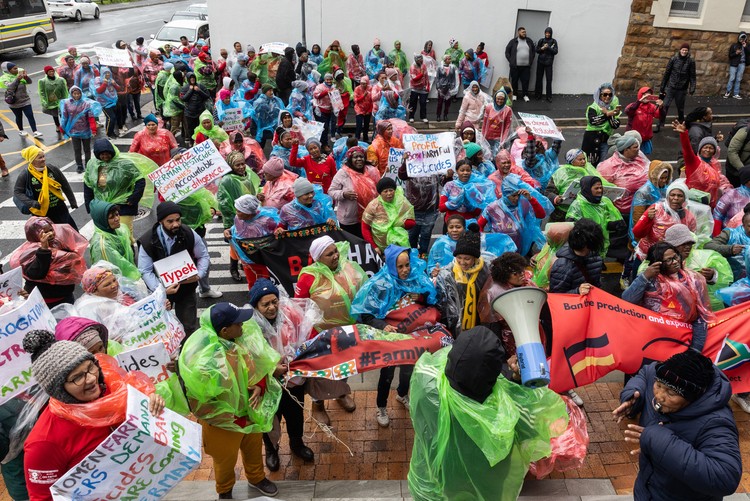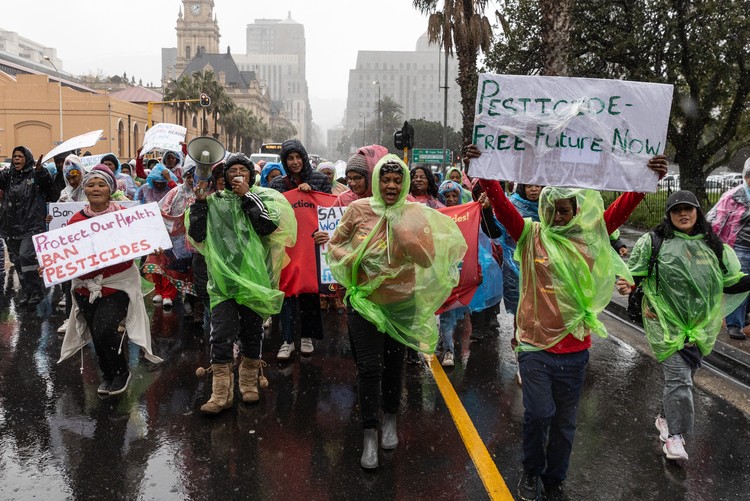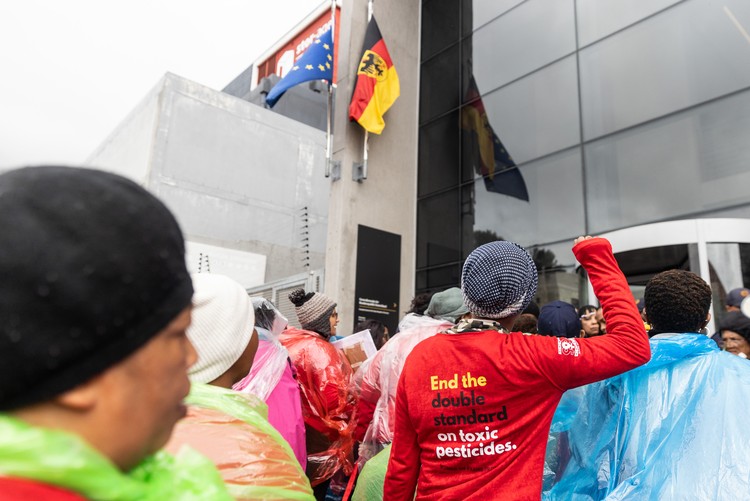Farm workers march in rain and wind to call for ban on pesticides
They want an end to exports of harmful pesticides from Germany
Women farm workers marched to the German Consulate-General in District Six to demand an end to imports of harmful pesticides from Germany. Photos: Ashraf Hendricks
More than 150 mostly women farm workers and supporters braved gale force winds and heavy rainfall on Tuesday to march through the streets of Cape Town calling for a ban on harmful pesticides.
Last month, the farm workers led by the organisation Women on Farms, picketed outside Parliament, demanding transparency and consultation over regulations on the use of pesticides.
On Tuesday, protesters wore brightly coloured raincoats and sang in spite of the wet weather. The placards, some covered in plastic, read “Stop killing us. Ban Pesticides now” and “Pesticide free future now”.
They marched to the German Consulate-General in District Six to demand an end to the export of harmful pesticides from German companies.
Lebo Ramafoko, Executive Director of Oxfam South Africa said that many farm workers are still forced to use “highly hazardous pesticides”. “These pesticides are banned in Europe, but Germany continues to export them into South Africa”, she said.
In 2019, the Women on Farms Project launched their ‘Double Standards Pesticides‘ campaign, calling on the South African government to ban 67 pesticides. These pesticides are already banned in the European Union.
The campaign is a partnership between Women on Farms Project, Oxfam South Africa and Oxfam Germany.
Ramafoko said that farm workers are using these pesticides to produce the wines and vegetables that are consumed by South Africans as well as products that are exported.
Protesters marched in the pouring rain on Tuesday.
Ramafoko said the German government should ban the export of the 67 pesticides. Farm workers who work with these pesticides face a number of “health challenges”, she said.
Dina Ndeleni, a farm worker from De Doorns who travelled to Cape Town for the march, said she suffers from respiratory issues and uses an inhaler regularly.
Ndeleni said that she doesn’t understand why these banned pesticides are being sent to SA. “Are we in South Africa wild animals that must die?” she asked.
“Our lives are just as important as those people in Europe,” said farmworker Jo-ann Johannes from Simondium. “Aren’t our lives more important than money? Because all those big companies are making millions and millions of rands exporting these pesticides to us here in South Africa.”
The group handed over a memorandum of demands to a representative from the German Consulate-General.
The Women on Farms Project has launched a ‘Double Standards Pesticides‘ campaign calling on the South African government to ban the use of 67 pesticides.
Support independent journalism
Donate using Payfast

Letters
Dear Editor
This is really a disgusting situation! As always happens, someone is getting rich while the poor farm workers suffer. And that while it the pesticides have been banned in the whole of Europe!
Please put a stop to this immediately!
Dear Editor
Writing from Germany, I agree with the claims of the farm workers. I do think, too, that those pesticides should be banned worldwide, if they are banned in Europe.
On the other hand, there must be someone in South Africa who buys and imports those pesticides. Isn‘t it the responsibility of these persons and companies to move away from these pesticides and not to import them, when it is well known that they are dangerous to health? Or in other words: it is not ONLY the German companies, that are responsible, but also some South Africans. They should be attacked and accused in the same way. The South African import companies too are the ones that treat the workers like wild animals that must die.
Dear Editor
Full marks to our brave farm workers for taking a strong stand, especially in such awful weather, regarding the shocking abuse of imported pesticides that they are forced to work with - let alone that we South African consumers are then made to buy these fruit/vegetables.
Germany, stop your hypocrisy and do immediately what is the only right thing to do. South Africa, ban them without worrying about trampling on other countries' feelings. This is so not ethical and correct in ANY way!
Dear Editor
Stop poisoning not only humans and animals, but the planet! Pesticides go into the food, into the ground, into the water, into the air. When you die, you take nothing with you. No money can buy life.
© 2024 GroundUp. This article is licensed under a Creative Commons Attribution-NoDerivatives 4.0 International License.
You may republish this article, so long as you credit the authors and GroundUp, and do not change the text. Please include a link back to the original article.
We put an invisible pixel in the article so that we can count traffic to republishers. All analytics tools are solely on our servers. We do not give our logs to any third party. Logs are deleted after two weeks. We do not use any IP address identifying information except to count regional traffic. We are solely interested in counting hits, not tracking users. If you republish, please do not delete the invisible pixel.



